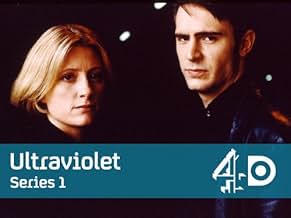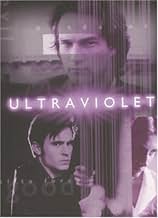IMDb RATING
7.8/10
2.9K
YOUR RATING
The six-episode series, first aired in 1998, stars Jack Davenport as Detective Sergeant Michael Colefield, who discovers a secret government vampire-hunting unit while investigating the disa... Read allThe six-episode series, first aired in 1998, stars Jack Davenport as Detective Sergeant Michael Colefield, who discovers a secret government vampire-hunting unit while investigating the disappearance of his partner.The six-episode series, first aired in 1998, stars Jack Davenport as Detective Sergeant Michael Colefield, who discovers a secret government vampire-hunting unit while investigating the disappearance of his partner.
Browse episodes
Storyline
Did you know
- TriviaCreator Joe Ahearne never intended to write and direct all six episodes. While the producers commissioned scripts from other writers, they ultimately felt that no other writers or directors understood Ahearn's vision as well as he. The result was that Ahearn's time was consumed with the development of the first series, and he was never able to outline a second arc. Ahearn also admits that he believes high-concept series are best kept short, so that they don't run out of steam and have to be re-invented.
- Quotes
Father Pearse J. Harman: Our free range days are over.
- ConnectionsRemade as Ultraviolet (2000)
Featured review
If not for the 2003 reboot of Battlestar Galactica, I would say "Ultraviolet" was by far the best scifi TV show of the last 20 years. Indeed it has much in common with Battlestar, making me wonder if Battlestar creators were influenced by this great show. Foremost we are challenged with themes of moral ambiguity like never before. By that, I mean we are forced to question who are the "good guys", who are the "bad guys", and are there any limits to what injustices we commit in the name of war? For example, in one very jarring episode, we are faced with the conundrum: are the "good guys" justified in forcefully performing an abortion on an unwilling woman simply because her fetus could be a vampire hybrid?
But I'm getting ahead of myself. Let's start with the basic premise. It's the age old concept of vampires preying on humans and humans fighting back, except "Ultraviolet" delivers a very clear metaphor which other vampire tales only hint at. I'm speaking of the ecological metaphor of 1 species being at the top of the food chain and feeling the need to regulate & control all species below it. Sound like any species you know?
I applaud the writer for not mincing words. Direct comparisons are made toward human use (and abuse) of cattle & other livestock. At one point one of the human characters summarizes the situation very clearly by describing how the vampires could have humans all in farms within the next 50 years, punctuating it with, "our free-range days are over."
I think this is what has intrigued us for centuries about the classic vampire myth: the idea that there may be a super predator that feeds on us. Will it treat us the same way we treat the lifeforms we consume? Or will it strive for fairness, mutual benefit and true symbiosis with other lifeforms? After all, as one vampire points out, "we all share this planet." This is very progressive stuff, certainly far beyond the standard screamer flicks about bloodsucking monsters.
Another point that makes this groundbreaking for a vampire story is that it's one of the earliest versions that puts a hi-tech scientific spin on the battle. No wooden stakes and garlic cloves here; instead the humans use carbon bullets and allicin grenades, allicin being a garlic derivative. Also, the word "vampire" is never uttered (it must be a British thing, like in the 1983 vampire film "The Hunger"). But traditional elements remain, such as vampires not casting reflections, and more interestingly, a complex antagonistic relationship with the Catholic Church. The church's role is never fully explained, but that's part of the show's charm. At one point the vampire killers' justice is referred to as the new Spanish Inquisition, again making us question who the good guys & bad guys are.
I probably should've said up front that there isn't a ton of action in these episodes. So if straight up action is what you're after, you might want to look elsewhere. But suspense, tension, mystery, great character development, and above all poignant questions of morality are laid on thick. Again, I can't help bringing up Battlestar Galactica which is the only other TV show I've seen that forces us to decide for ourselves who are the good guys & bad guys.
It's a crying shame that this show never got a 2nd season. But apparently writer/director Joe Ahearne was reluctant to do even the six episodes we got. For that reason, the show does end on a decent finale that answers most questions. If you want to believe it. Me personally, I'd like to think that the season 1 finale presents just one possible side of the story, and a 2nd season could show us the other. Yeah I still have hopes that, after 15 years, we'll get a 2nd season. Then again, I'm still waiting for I Dream of Jeannie season 6.
I have to say a word about the cinematography, editing & soundtrack: magnificent. Particularly in episode 5 when one of the main characters gets locked in a warehouse with a vampire time bomb slowly counting down, the drama is presented in a classy, cinematic way we rarely get on the small screen.
If you're a fan of dark, gritty, suspenseful shows that challenge both your mind and your moral fiber, definitely check this show out. By the way, it has absolutely nothing to do with the 2006 vampire flick "Ultraviolet" with Milla Jovovich. Although there was a 2000 pilot of this series for American audiences produced by Fox (who admitted they "screwed it up"), this killer vampire story hasn't seen the light of day. Start writing in letters, people! Watch it and I'm sure you'll agree; someone needs to resurrect Ultraviolet!
But I'm getting ahead of myself. Let's start with the basic premise. It's the age old concept of vampires preying on humans and humans fighting back, except "Ultraviolet" delivers a very clear metaphor which other vampire tales only hint at. I'm speaking of the ecological metaphor of 1 species being at the top of the food chain and feeling the need to regulate & control all species below it. Sound like any species you know?
I applaud the writer for not mincing words. Direct comparisons are made toward human use (and abuse) of cattle & other livestock. At one point one of the human characters summarizes the situation very clearly by describing how the vampires could have humans all in farms within the next 50 years, punctuating it with, "our free-range days are over."
I think this is what has intrigued us for centuries about the classic vampire myth: the idea that there may be a super predator that feeds on us. Will it treat us the same way we treat the lifeforms we consume? Or will it strive for fairness, mutual benefit and true symbiosis with other lifeforms? After all, as one vampire points out, "we all share this planet." This is very progressive stuff, certainly far beyond the standard screamer flicks about bloodsucking monsters.
Another point that makes this groundbreaking for a vampire story is that it's one of the earliest versions that puts a hi-tech scientific spin on the battle. No wooden stakes and garlic cloves here; instead the humans use carbon bullets and allicin grenades, allicin being a garlic derivative. Also, the word "vampire" is never uttered (it must be a British thing, like in the 1983 vampire film "The Hunger"). But traditional elements remain, such as vampires not casting reflections, and more interestingly, a complex antagonistic relationship with the Catholic Church. The church's role is never fully explained, but that's part of the show's charm. At one point the vampire killers' justice is referred to as the new Spanish Inquisition, again making us question who the good guys & bad guys are.
I probably should've said up front that there isn't a ton of action in these episodes. So if straight up action is what you're after, you might want to look elsewhere. But suspense, tension, mystery, great character development, and above all poignant questions of morality are laid on thick. Again, I can't help bringing up Battlestar Galactica which is the only other TV show I've seen that forces us to decide for ourselves who are the good guys & bad guys.
It's a crying shame that this show never got a 2nd season. But apparently writer/director Joe Ahearne was reluctant to do even the six episodes we got. For that reason, the show does end on a decent finale that answers most questions. If you want to believe it. Me personally, I'd like to think that the season 1 finale presents just one possible side of the story, and a 2nd season could show us the other. Yeah I still have hopes that, after 15 years, we'll get a 2nd season. Then again, I'm still waiting for I Dream of Jeannie season 6.
I have to say a word about the cinematography, editing & soundtrack: magnificent. Particularly in episode 5 when one of the main characters gets locked in a warehouse with a vampire time bomb slowly counting down, the drama is presented in a classy, cinematic way we rarely get on the small screen.
If you're a fan of dark, gritty, suspenseful shows that challenge both your mind and your moral fiber, definitely check this show out. By the way, it has absolutely nothing to do with the 2006 vampire flick "Ultraviolet" with Milla Jovovich. Although there was a 2000 pilot of this series for American audiences produced by Fox (who admitted they "screwed it up"), this killer vampire story hasn't seen the light of day. Start writing in letters, people! Watch it and I'm sure you'll agree; someone needs to resurrect Ultraviolet!
- How many seasons does Ultraviolet have?Powered by Alexa
Details
Contribute to this page
Suggest an edit or add missing content



































